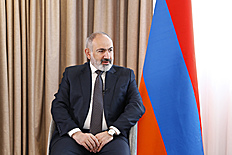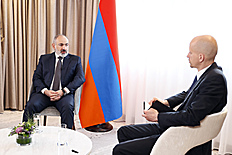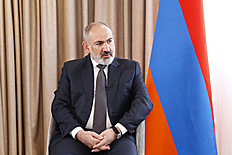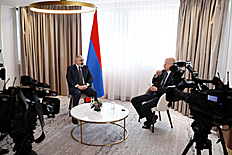Interviews and press conferences
Prime Minister Nikol Pashinyan's interview with CNN Prima News
more 1 photos
Prime Minister of Armenia Nikol Pashinyan gave an interview to the CNN Prima News within the framework of his official visit to the Czech Republic on May 4-5.
The transcript of the Prime Minister's interview is presented below.
CNN Prima News - It is obvious that the main problem of Armenia today is the situation in Nagorno Karabakh. About 120,000 Armenians remain in Nagorno Karabakh at the moment. They depend on one land corridor controlled by Russian troops. So, what is the economic, humanitarian and security situation of the population in Nagorno-Karabakh at the moment?
Prime Minister Nikol Pashinyan - You know that Azerbaijan has illegally blocked the Lachin Corridor since December last year. We say illegally, because according to the tripartite declaration of November 9, the Lachin Corridor was established to ensure the connection of Nagorno Karabakh Armenians, Nagorno Karabakh with the Republic of Armenia. And according to the tripartite declaration, Azerbaijan should not have any control over that corridor. Moreover, the corridor is not only a road, but also a 5 km wide safety zone. The blocking is therefore illegal.
As a result of the blockade, a humanitarian crisis has emerged in Nagorno-Karabakh, because, firstly, people are deprived of the right to move, and secondly, the supply of food and basic necessities takes place with interruptions, through the peacekeepers and the Red Cross. And the consequence of this is that people can buy goods in stores only with coupons issued by the government of Nagorno-Karabakh, so that food stocks can be managed.
Natural gas and electricity cuts in Nagorno-Karabakh have been continuous since December of last year, and at the moment natural gas and electricity are not supplied to Nagorno-Karabakh. The most important consequence of this during the winter months was that all schools and kindergartens, higher education institutions were closed, and about 30,000 children and students were deprived of their right to education. Of course, with the weather getting warmer, kindergartens, schools, and universities have already opened, and the educational process has been restored.
The next important fact that should be noted in this context is the following. Already in February 2023, the International Court of Justice made a provisional decision obliging Azerbaijan to unblock the Lachin Corridor and ensure the movement of citizens and goods through the Lachin Corridor. Azerbaijan not only did not comply with the requirement of that decision, which is legally binding because the International Court of Justice is the highest international court, but also illegally set up a checkpoint in the Lachin Corridor about ten days ago. This is a violation not only of the tripartite declaration of November 9, 2020, but also of the decision of the International Court of Justice.
So, why is Azerbaijan doing all this? Our assessment and belief is that these are not isolated actions, but preparations to carry out ethnic cleansing in Nagorno Karabakh, when I say ethnic cleansing, it is about that according to Azerbaijan, Armenians should not live in Nagorno Karabakh at all.
CNN Prima News - Since the beginning of the 90s, Armenia has been quite dependent on Russia from a security point of view, you have a Russian military base in Armenia, you have Russian weapons, you are both members of the Security Treaty Organization, so I have a kind of two-fold question: was it a smart move? and on the other hand did you have other options?
Prime Minister Nikol Pashinyan - Basically, today we are in a situation where there is some disappointment regarding the activities of the Collective Security Treaty Organization, because the Collective Security Treaty Organization is the main mechanism by which the Republic of Armenia was supposed to ensure its security. But during the aggressions undertaken by Azerbaijan in May and November 2021 and September 2022, the inadequate response of the Collective Security Treaty Organization has caused some disappointment, first of all, among the people of Armenia, because there was some confidence that the Collective Security Treaty is a reliable security mechanism.
But it did not happen, and this was also the reason why we did not consider it possible to establish a consensus on a number of fundamental documents during the CSTO Yerevan summit. But I want us to look at the issue from the opposite side as well, because it is also harmful for the organization, because, in fact, what happened with Armenia in the period I mentioned, is first of all a blow to the reputation of the Collective Security Treaty Organization. In other words, this will also have certain consequences for the organization itself.
CNN Prima News - I think throughout the war, and at the summit in Yerevan last November, when you refused to sign the document, and Mr. Lukashenko was shocked, and Mr. Putin was obviously angry, I haven't seen him that angry in a long time, and he left in frustration.
Prime Minister Nikol Pashinyan - These are working situations, and after that a working lunch was held, and we discussed the current state of affairs and how we can overcome the situation in a calm, respectful atmosphere.
CNN Prima News - How is your personal relationship with Vladimir Putin? He seems like a very cold person, almost emotionless. Do you have a working relationship with him, or do you have a personal relationship or not, or is it a matter of the two states?
Prime Minister Nikol Pashinyan - In general, I must say that the impressions seen from the screens, the impressions of real life, the complications that we are experiencing and the difficult periods that we are in, are actually different layers. And yes, our communication with the President of the Russian Federation has been very intense and continues to be intense.
We will meet at least 2 times this month. And I must say that it is both a personal contact, a political contact, and a working contact. Another thing is that, especially now, we do not discuss much, or we hardly discuss the issues that are not related to the agenda of our bilateral relations or our regional agenda. I will tell you something honestly: Armenia has too many problems to bear the problems of the wider region and parts of the world on its shoulders. Unfortunately, our concerns are more than enough, and in our relations with the European Union, the United States and Russia, we are trying to solve the problems of our agenda, which, as you can see, unfortunately, is not always successful.
CNN Prima News - And what is Armenia's position regarding the Ukrainian war, Russian aggression on Ukraine, because on the one hand you are Russia's ally, on the other hand we are witnessing very undesirable actions by the Russian Federation in Ukraine.
Prime Minister Nikol Pashinyan - You said that we are Russia's ally. Of course, this was never said out loud, but I think it is visible. We are not Russia's ally in the war with Ukraine. And our feeling from that war, from that conflict, is anxiety because it directly affects all our relationships.
In the West they notice that we are Russia's ally, they mostly notice it, in Russia they see that we are not their ally in the Ukraine war, and it turns out that we are not anyone's ally in this situation, which means that we are vulnerable. Because, it seems that there is an option to avoid among all these collisions, but also the truth is that the more complicated the situation, the narrower the chances for avoiding. We are avoiding not because we don't have opinions about the situation, but we're avoiding it because of what I said a moment ago, that our concerns are, unfortunately, more than they will allow us to be more involved in coping with other problems.
CNN Prima News - Armenia is in a very difficult political situation. Your big neighbor is Turkey, Russia is another big regional power, there is also Iran, and the European Union seems to be quite far away, but how can the European Union realistically help solve the complex issue facing Armenia, the Nagorno Karabakh issue? Do we actually have options, are there any levers in our hands?
Prime Minister Nikol Pashinyan - First of all, our strategy stems from what you mentioned. Look, you say that we are in a difficult geopolitical situation. Actually, we are not in a difficult geopolitical situation, we are in a geographical situation.
In other words, our complexity is not from geopolitics, our complexity is from geography, because no matter how the politics of the world changes, our geography will not change. And for that reason, we offer and have offered the following political vision to our people, that the primary goal of our foreign policy should be normal relations, first of all, with our immediate neighbors, no matter how difficult it is even to hear, because history has brought with it so much complexity, so much negative baggage.
CNN Prima News - You came to power as a result of the Velvet Revolution in Armenia, which reminds all Czechs of the Velvet Revolution of 1989. Two years later, you faced the biggest challenge of the Armenian people since the beginning of the 90s. Did you expect to face such a challenge?
Prime Minister Nikol Pashinyan - I can say, I think that interview has been published, it was definitely before the revolution. once I was asked who is your ideal politician, I named two people, if my memory serves me right, I must have said Nelson Mandela and Václav Havel. And indeed the revolution that we carried out, those examples and the example of Czechoslovakia, of course, were always in my mind and before my eyes. Could I have assumed, yes, I could have assumed, but on the other hand, I couldn't have assumed that it was actually not only a challenge, but in this case, a geopolitical trap, and a stalemate.
Of course, I think about it a lot and, of course, I ask myself questions, and I must say directly that I have not yet found the answers to all the questions for myself. To assume, of course, one can always assume, but of course, a person is optimistic by nature and is an optimist, although there is such a saying, that an optimist is a poorly informed pessimist. Naturally, the more I learned after assuming the post of Prime Minister, the more optimism decreased.
CNN Prima News - Mr. Prime Minister, thank you for your time and I wish you success in your difficult task.
Prime Minister Nikol Pashinyan – Thank you.



